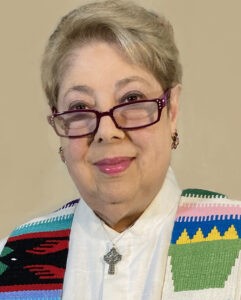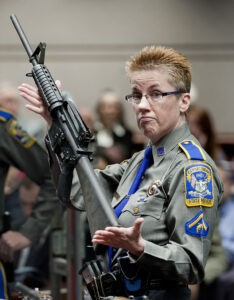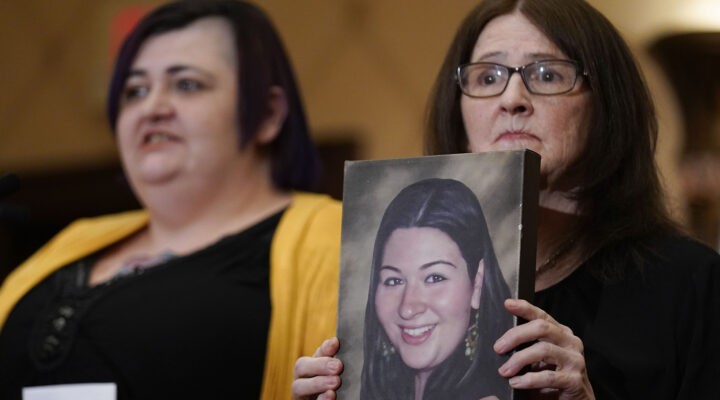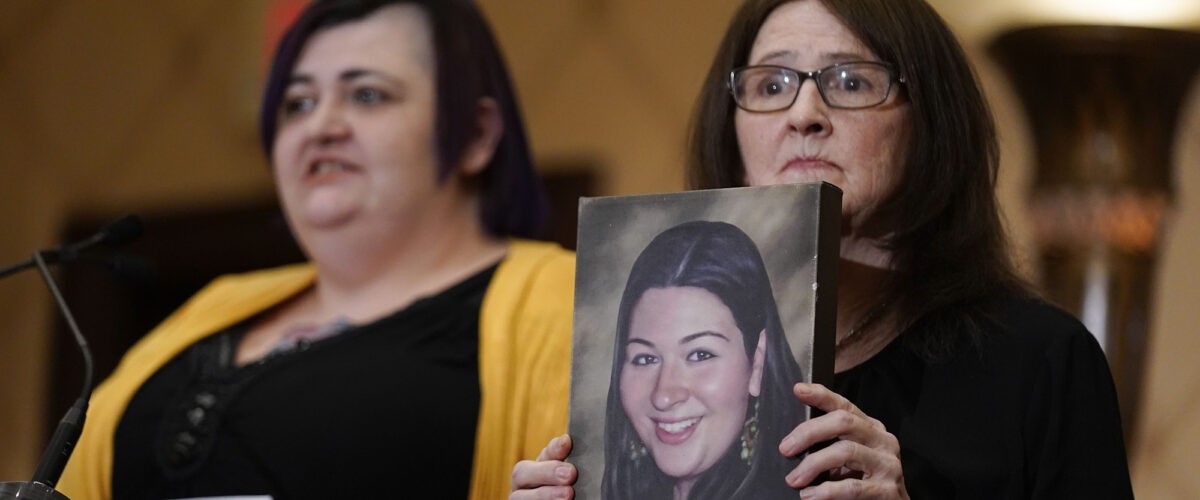Can activism be an expression of faith? Can the practice of my faith, as an activist against violence and all the evils related to it, fulfill the Great Commandment? What might happen if people of faith intentionally examined the nature of ethics, the foundations of good and bad character and conduct, and their personal faith convictions, moral conscience, ethics, and political will to work for necessary change?
Associated Press columnist Dave Collins writes about some good news in a Feb. 15, 2022, news report. “The families of nine victims of the Sandy Hook Elementary School shooting have agreed to a $73 million settlement of a lawsuit against the maker of the rifle used to kill 20 first graders and six educators in 2012.”

Kathy Manis Findley
Is the settlement “too little too late?” The $73 million settlement came to fruition 10 years after the Sandy Hook shooting. In those 10 years, families mourned, and questioned, and lamented, and some became activists working for the reparations that could never truly repair their souls and certainly never could rid them of their sense of emptiness.
Maybe their homes had been too quiet without the lighthearted sounds that only a child can make. Perhaps they could no longer drive past Sandy Hook Elementary School. I imagine that some may have endured 10 full years of losing hope and struggling with faith. Even $73 million has no power to recompense this kind of deep loss. Too little.
Communities of faith generally receive accolades on the many ways they protect and nurture the children in their communities, but people of faith also must find ways to protect all children — at-risk children, abused children, neglected children, and school children. School children everywhere in this country seem to be at great risk just by attending school. When school shooters have easy access to lethal firearms, every school is in danger, every child is in danger.
This statement from a report by Hartford Courant Tribune reveals troubling information about Remington’s marketing practices. “The civil court case in Connecticut focused on how the firearm used by the Newtown shooter — a Bushmaster XM15-E2S rifle — was marketed, alleging it targeted younger, at-risk males in marketing and product placement in violent video games.”

Firearms training unit Detective Barbara J. Mattson, of the Connecticut State Police, holds up a Bushmaster AR-15 rifle, the same make and model of the gun used by Adam Lanza in the December 2012 Sandy Hook School shooting, during a hearing of a legislative subcommittee in Hartford, Conn., Jan. 28, 2013. (AP Photo/Jessica Hill, File)
Does that mean the advertising virtually places a firearm in every young person’s hands? This kind of advertising increases a child’s desire to have a firearm, just as a commercial for a newly released video game can send millions of children and teens rushing in urgent haste to buy it.
I freely admit that I am a lifelong activist against violence. I am aware that I have managed to make very little change in a world that needs an enormous amount of change. I have joined in activism to create change in domestic and sexual violence, child abuse, health care, women’s issues and yes, gun control. Because of my activism, The Trace, an organization that has built the only team of journalists exclusively dedicated to reporting on this country’s gun violence crisis, contacted me in April 2021 requesting an interview about how gun violence has impacted my ministry and my advocacy with victims. To their credit, they actually did a Google search to find a clergyperson who is also an anti-violence activist.
The Trace sent journalist Ann Givens to interview me. A talented journalist who also cares about transformative work to end violence, Ann spent more than a month and conducted many interviews, in person and through email. She sent a photographer to do a photo shoot. I was impressed she would send someone to spend at least two hours taking photographs of me, probably more than a hundred. I wondered later how the newsmagazine managed to include what had to be the worst photo of me in the pile. But that’s just trivia.
What is most important is that people of faith consider participating in activism and advocacy. The problem of gun violence, and school shootings in particular, will not simply fix itself. Consider statistical data published by The Trace:
- The number of gun deaths in America hit an all-time high in 2020, mostly because of an increase in homicides. 45,222 people died of gunshot wounds — a 14% jump from 2019 and the largest year-over-year rise on record.
- Firearm injury is now the 13th leading cause of death, eclipsing car crashes for the fourth year in a row, and by a larger margin than ever before.
- The steep increase in gun deaths was driven largely by homicides, which spiked 35% between 2019 and 2020. Guns were used in a greater proportion of homicides than ever before: 79%, up from 74% in 2019.
- Suicides, meanwhile, remained relatively steady. Over the last decade, suicides have accounted for more than 60% of gun deaths.
As for school shooting statistics, the numbers provided by Sandy Hook Promise should alarm all Americans and all faith communities:
- Each day, eight children die from gun violence in America. Another 32 are shot and injured. The U.S. has had 1,316 school shootings since 1970, and these numbers are increasing. Further, 18% of school shootings have taken place since the tragedy at Sandy Hook Elementary School in December 2012.
- In a comprehensive study of school shootings from 1974 to 2000 conducted by the Secret Service and Department of Education, 93% of school shooters were found to have planned the attack in advance.
- 39% of parents wrongly believe children don’t know where a gun is stored.
- In four out of five school shootings, at least one other person had knowledge of the attacker’s plan but failed to report it.
- Guns used in about 68% of gun-related incidents at schools were taken from the home, a friend or a relative.
- An estimated 4.6 million American children live in a home where at least one gun is kept loaded and unlocked.
Surely there is a critical role for people of faith who are willing to work for change and who see the great harm our country’s children potentially face — the young victims and the young shooters. I know not everyone has a passion for social activism. But the fracture in this country most likely will continue as opposing factions stand their ground and refuse to move close enough together to effect healthy compromise for what is good and right.
No sooner than this headline about the $73 million settlement was released, the news report most likely left the attention of most Americans, just as the Sandy Hook massacre did. I recall that, when that horrific slaughter happened in December 2010, this nation gasped and grieved collectively in response to the massacre of 20 young children and six adults. President Barak Obama said to us, “Surely we can do better than this,” as he boldly called for new legislative initiatives.
“Nothing happened. Legislative initiatives were stopped at every turn.”
Nothing happened. Legislative initiatives were stopped at every turn. We got through Sandy Hook, and the more than 200 school shootings that happened in the U.S. after Sandy Hook, by taking on a posture of societal denial.
The activists were still lobbying, the advocates continued to help victims, the families still mourned, and some of them founded nonprofit organizations to address the wide scope of the gun problem. The general public did little or nothing. Perhaps the faith community did little or nothing.
It is difficult to find compelling insight on Twitter, given its 140-character limit. Yet a June tweet from British political commentator Dan Hodges got some attention.
“In retrospect,” wrote Hodges, “Sandy Hook marked the end of the U.S. gun control debate. Once America decided killing children was bearable, it was over.”
In deciding between its children and its guns, America had decided the loss of the former was, in Hodges’ chilling word, “bearable.” This assessment should cause us to shudder. And if we, as people of faith, have done nothing to bring about change — like contacting legislators, being involved in our schools, attending an anti-gun violence rally, praying for the safety of all children — then we should cover ourselves in lament and contrition.
Perhaps the Lenten season ahead would be a good time for lament and contrition. After all, since people of faith are the ones who never give up on hope and always live into faith, then people of faith should also reach out to educators, parents and families of victims who desperately need hope and faith.
Kathy Manis Findley is an ordained Baptist minister with Greek Orthodox roots. Now retired in Macon, Ga., she spent her 38-year ministry serving as a pastor, hospital chaplain, trauma counselor and missionary to Uganda. She is a graduate of Southern Baptist Theological Seminary and is certified in victimology, trauma intervention and child forensic interviewing. She is the author of two serious books, Voices of our Sisters and The Survivor’s Voice: Healing the Invisible Wounds of Violence and Abuse, and just for fun, one Kindle novel.
Related articles:
Seeing gun violence as a pro-life issue | By Shane Claiborne and Michael Martin
‘Thoughts and prayers’ not enough to end gun violence, religious leaders say
Here’s the link between COVID vaccine denial and opposition to sensible gun control | Opinion by Mark Wingfield


